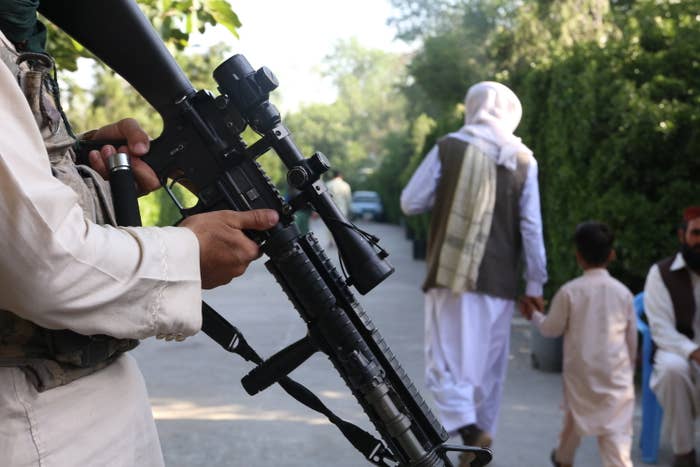
KABUL — Akrami, a 36-year-old resident of Kabul, heard early in March that the Taliban might show up at his door soon. They had been conducting search operations in the eastern part of Kabul, and he suspected he might be a target because of the 15 years he spent working at a Western-backed government agency. He remembered expecting them to arrive at his home in a day or two. Instead, they showed up at his doorstep an hour later. When he opened the door, he saw a dozen Taliban members headed his way.
Akrami said the men rushed inside his house without permission and demanded he submit any weapons he owned before searching his home.
“I told the Taliban interrogators that I was working in a civilian department – I don’t keep any weapon or military equipment,” said Akrami, who spoke to BuzzFeed News on condition that his full name and the institution he worked for are not printed for security reasons.
Many Afghan residents worry that the newly formed Taliban government is using the war in Ukraine as cover to carry out aggressive door-to-door search operations in and around major cities in the country. “The Taliban are killing us one at a time,” Homeira Qaderi, an Afghan women’s rights activist, wrote on Twitter. “The world is preoccupied with the Ukraine crisis. We have been relegated to the back-burner.”
The Taliban are killing us one at a time. The world is preoccupied with the Ukraine crisis. We have been relegated to the back-burner. #HumanRights #Afghanistan
BuzzFeed News spoke to three Afghan citizens in Kabul and in Kandahar provinces who said they’ve witnessed or been subject to the impromptu searches by the Taliban in recent weeks.
Describing the purpose of one recent search operation, Taliban’s spokesperson, Zabihullah Mujahid, said in a news conference that its aim was to catch criminals, and that “two teenagers were rescued from the kidnappers and the perpetrators were arrested.”
For many Afghans across the country, the fear and anxiety of wartime never dissipated. In the nine months since the Taliban swept into power through military force, life for ordinary civilians in the country has grown considerably worse. The country’s healthcare infrastructure has collapsed, leading to a spike in premature births and infant mortality rates, and efforts at post-war recovery have struggled under an economic recession, diplomatic isolation, and a steady stream of reports about human rights violations. The United Nations reported that it received credible allegations that more than 100 former members of the Afghan government, members of the Afghan Security and Defense forces, and those who worked with international troops were killed after the takeover in August.
The Taliban has shuttered 318 media outlets, according to a survey conducted by the Afghanistan National Journalists Union. As part of the US–Taliban peace agreement, the Taliban had committed to allow all girls to go to school, but then backtracked and announced they would not allow girls to go to school beyond the sixth grade.
Yet while the Taliban are known for their radical way of ruling, the increasing prevalence of search operations mark an escalation that has sparked panic among the public.
In January, the Taliban raided an apartment in Kabul and arrested several women’s rights activists who had participated in a march in the capital city. The activists spent several weeks in custody and were later released thanks to pressure from the international community.
During another search in early March, the Taliban arrested Sayed Baqir Mohseni, a university professor who is a staunch critic of the regime from Kabul. He was transferred to an unknown location and wasn’t heard from for three nights. Mohseni’s arrest sparked outrage among Afghans on Twitter. “You can't suffocate those who are trying to say the truth,” said an activist in Kabul, Shaima, who spoke to BuzzFeed News on condition of anonymity. Mohseni was released after two days, then described his detainment as a “misunderstanding” in the press.
Sina, who lives in Kabul’s Mikrorayon neighborhood and declined to give his last name due to security concerns, said that the Taliban arrived at his home around 10 a.m. and cordoned off the area before starting the search. He counted around two dozen people canvassing the block. “They rushed to the corridor,” Sina said. “I saw them breaking the locks of some apartments, because owners weren't there while the operation was underway.”
According to Sina, during the search operation in his area, he saw the Taliban beating a man for serving in the Afghan commando unit under the previous government. “Other neighbors came to the scene and tried to save the man from beating,” Sina said.
Another resident, Sadiq Ali Jan, who lives in Kabul’s Kampany neighborhood, said that some people went missing a few days after the search operation by the Taliban.
In Kandahar province, the traditional heartland of the Taliban in the south, a resident, Hatef Khan, said that the people have lost freedom of movement. "We can’t check our smartphones on the street, because there is fear that the Taliban could come and check private messages," said Khan, who grew up in the city.
Some experts believe that the conflict in Ukraine could have severe economic consequences for Afghanistan as the country continues grappling with a humanitarian crisis and economic meltdown.
“When there is no international monitoring, then the Taliban will not be accountable before the international community and the Afghan people for their policies,” said Qudrat Agha, a political activist in Kabul.
Mary Lawlor, the UN’s Special Rapporteur, echoed that concern, telling BuzzFeed News, “It’s crucial that the international community doesn’t forget what’s happening in Afghanistan in light of events elsewhere.”
